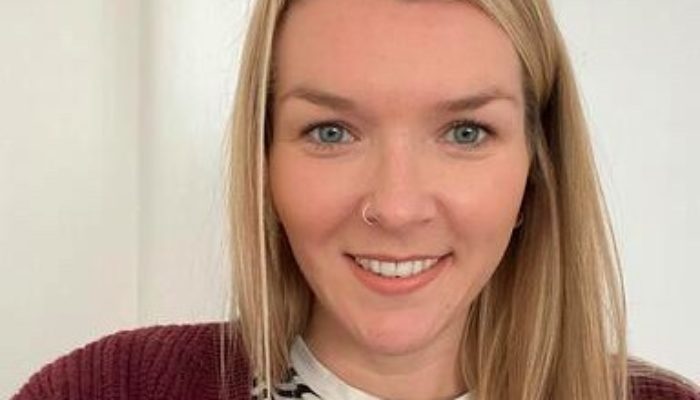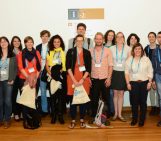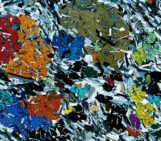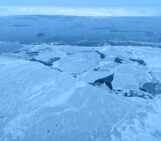
Hello Jenny. Thanks for agreeing to this interview! To break the ice, could you tell us a bit about yourself and your career?
Hello! ‘Break the ice’ is a relevant saying for me, as I started being involved with EGU through the Cryosphere division. I am originally from Birmingham in the UK, and moved to Lancaster for my undergraduate and masters degrees in physical geography and earth sciences. I then decided to do a PhD with the British Antarctic Survey (in Cambridge) and the University of Leeds. My research focused on atmosphere-ice interactions on the Antarctic Peninsula. After this, in 2017 I moved to Nuremberg/Erlangen in Germany to do a postdoc. My research experience has mostly been in atmospheric modelling and meteorological observations, but with a focus on how certain atmospheric processes affect the ice. My postdoc was focused on the largest remaining floating glacier in the Arctic, in the northeast of Greenland.
Alongside my research, I was always involved with science communication and outreach. I was part of the UK Polar Network and organised museum and school visits, as well as mentoring and event management. My involvement with EGU also developed from social media manager, to cryosphere division Early Career Scientist (ECS) representative to now Union-level representative. Through this, I’ve convened many sessions, short courses, and Great Debates at the EGU General Assembly, as well as organised networking events, career development workshops, and social activities. As this became more of an interest for me, I decided to leave academia and now I am a senior science advisor for a non-profit organisation based in Tromsø, Norway. Now, instead of researching the Arctic, I get to live there!
You’re the incoming Union-level Early Career Scientist (ECS) Representative, due to step into the role at the upcoming General Assembly! Could you tell our readers what ECS Representatives like yourself do for EGU and our ECS community?
Sure! Each of the 22 divisions at EGU have an ECS representative (find yours here!), who is responsible for voicing the concerns and ideas of ECS members in meetings. There are also two representatives who are independent of their division: the Union-level representative and the deputy union-level representative. We all meet roughly every 6 weeks online and discuss a range of items including networking events, short courses, and things we would like to change. Many divisions also have social media accounts and blogs, so we try to help share resources and information together. We also have a slack channel, where we have more informal discussions about EGU and what events we can organise. The Union-level representative sits on the council meetings, as well as some committees, to communicate between the council-level (e.g EGU president) and the ECS division representatives.
As a group of ECS representatives, we convene Short Courses (25% of EGU22 short courses) and Great Debates, organise networking events (not only for ECS but often for our whole division), run webinars and campfires, support our communities, write blogs, highlight common issues (e.g parenting in academia and career development) and much more! We also have a number of working-groups which focus on themes such as work-life balance, career development, effective communication, LGBTQ+ and medals/awards. Whilst ECS make up approximately 60% of the EGU membership, many of the events we organise are open to all EGU members.
What do you see yourself bringing to the role during your term as UL ECS Rep?
Ooo tough question, as I see it as a real team effort with all the ECS reps. I hope to bring in my perspective as someone who recently moved from academia to a job at the interface of science, policy and event organisation. I also have quite a few years of experience with other ECS groups and programmes, which I hope will bring in an outside view of where EGU can adapt. I am involved with the Global Task Force, with the sibling organisations of EGU, and I hope we can share resources and tips across the geosciences unions.
Alongside your research and ECS Rep work, you’re also an active science communicator with experience from working with schools to radio interviews. What advice do you have for our readers who are thinking about taking the step into science communication?
Start with communicating to young children. They’re always so enthusiastic to hear about cool science or to do some experiments. Schools are also very happy to have guest speakers too. Maybe reach out to your previous school and see if they have a ‘science inspiration day’ or a relevant assembly you could be a part of. Young kids can also be a good challenge, as the amount of science you can teach them needs to be small and manageable. Museum visits are also a good place to start, especially somewhere that already has some exhibitions related to your work, then you don’t need to make or take any props, and people attending museums are already interested in learning more. There are lots of early career and student committees that you could join. Ask your ECS rep, I bet they know some in your research area!
Lastly, what are you working towards in the future?
In the short term, I’m learning to adjust my work-life balance a bit more as I settle into life in a new country and city (Tromsø, Norway). There are many types of skiing to grasp and my Norwegian is a little rusty! Longer term? Appreciate that I can make career decisions further down the line now that I have a permanent contract!




